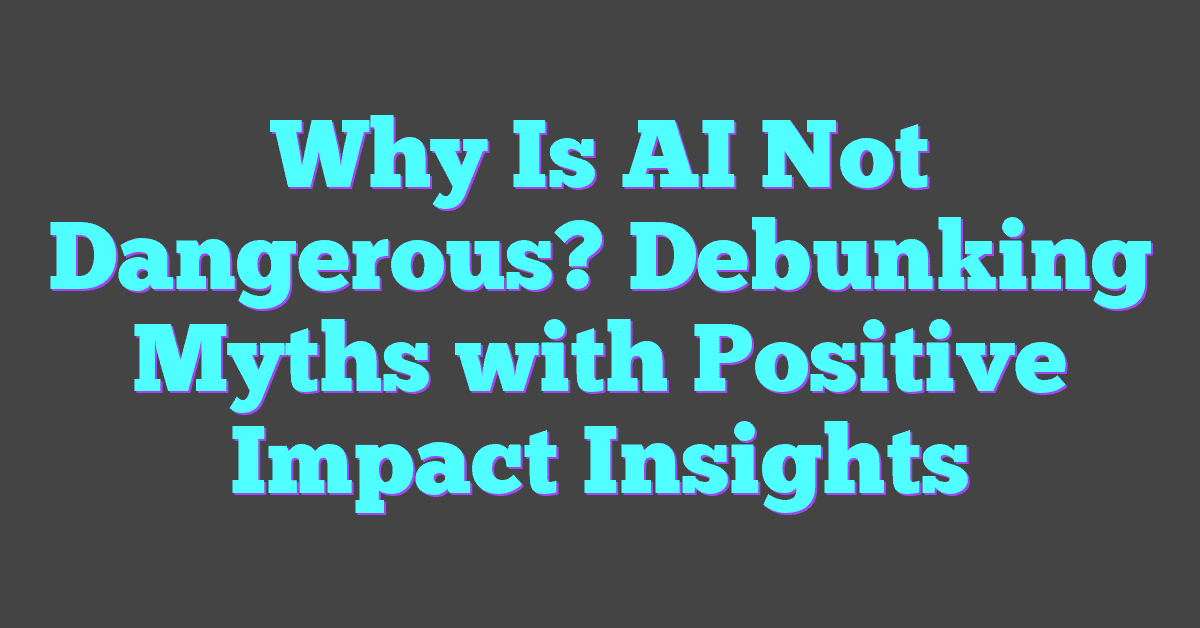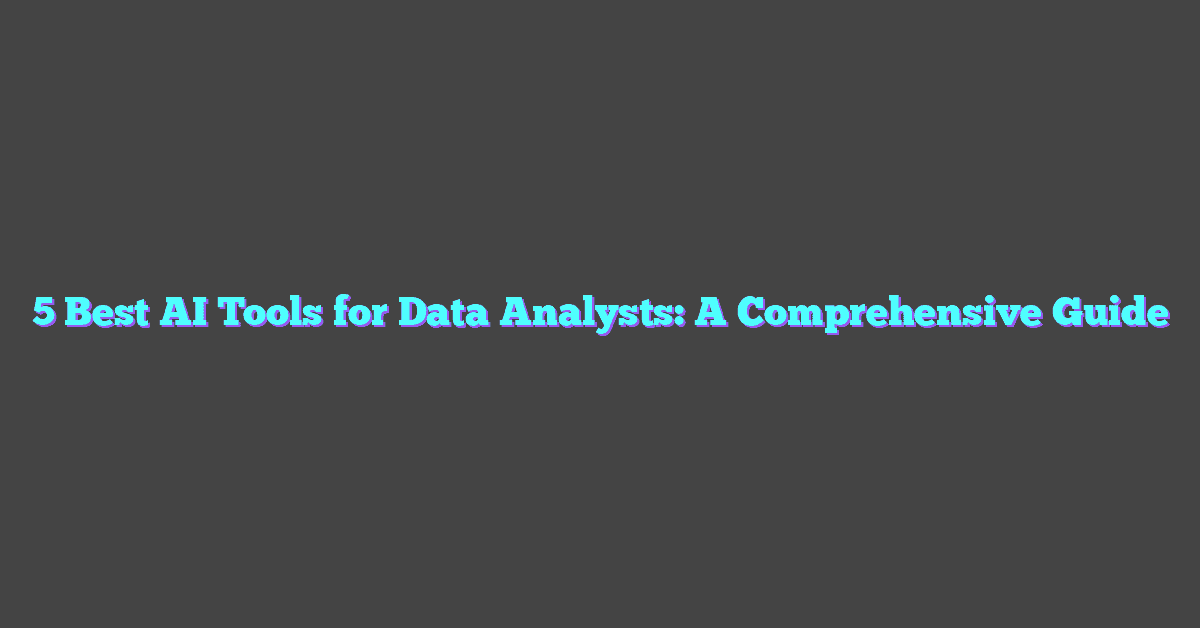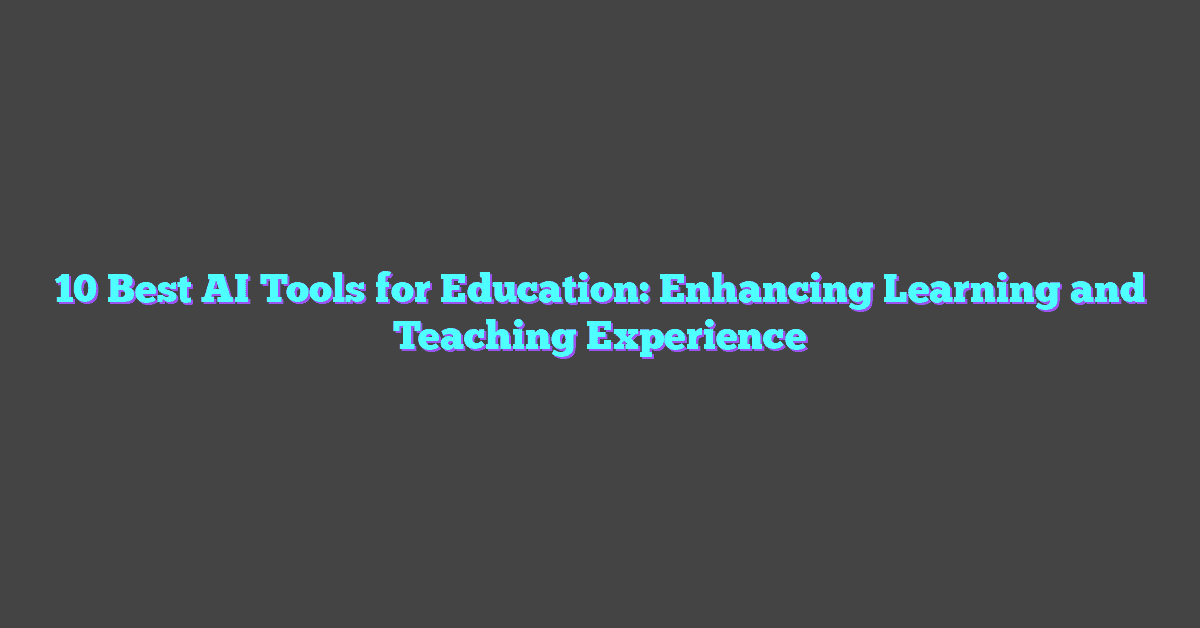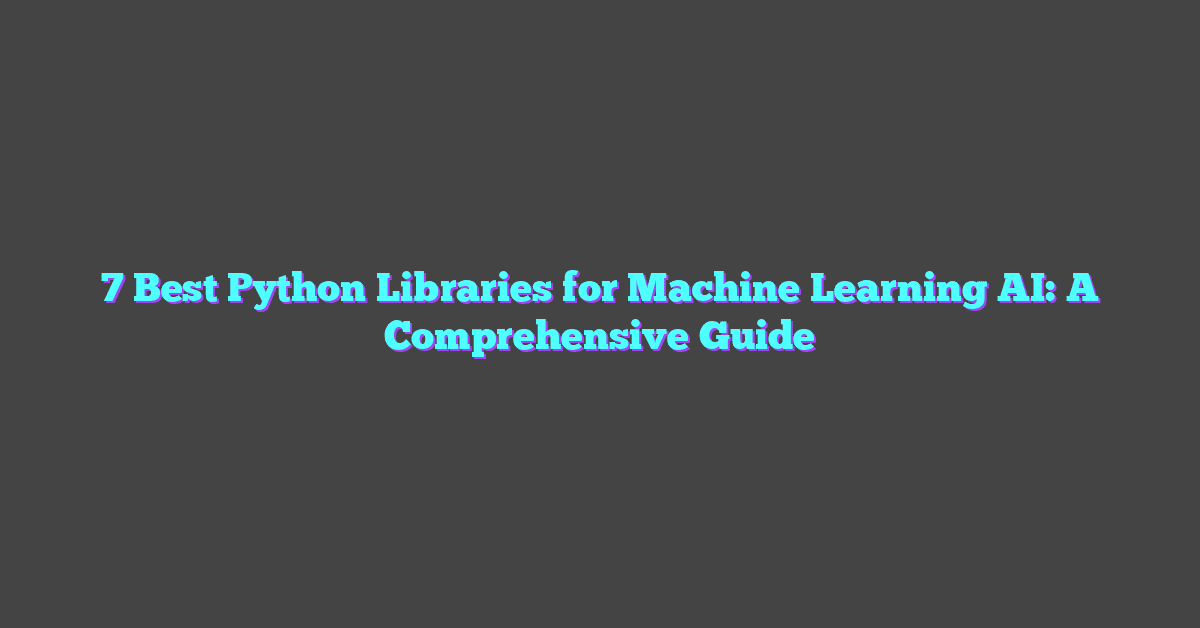Artificial intelligence has been a hot topic, often depicted as humanity’s potential downfall in sci-fi flicks. But let’s separate fact from fiction. AI isn’t the menacing force many believe it to be.
In this article, they’ll dive into the reasons why AI, rather than being a threat, is actually a beneficial tool that’s enhancing our lives. From safety features to personal assistants, AI’s helping hand is everywhere.
So, why do some folks fear AI? They’ll explore the myths and uncover the truth about AI’s real impact on society. Stick around to find out why AI isn’t the villain it’s often made out to be.
AI vs. Fiction: Separating Fact from Fiction
When delving into the world of artificial intelligence, one quickly realizes that the line between AI and the fantasies portrayed in science fiction movies is often blurred. Fiction paints a picture of self-aware robots with sinister agendas, but reality speaks to a different narrative. AI’s true nature is algorithmic and non-sentient; it’s designed to operate within a set of parameters defined by its human creators.
Interestingly, AI’s capabilities are frequently underestimated or misunderstood. Machine learning, a subset of AI, is a prime example of a technology that’s more tool than tyrant. Machine learning algorithms can analyze vast amounts of data, identify patterns, and make predictions, yet they lack consciousness and intention. They improve over time through exposure to new data, but they don’t “learn” in the human sense.
Here are several points where fact diverges from fiction:
- AI does not have desires: Unlike their fictional counterparts, real AI systems do not have personal goals or desires. They work towards objectives that have been predetermined by their developers.
- AI cannot act outside its programming: AI operates strictly within the parameters of its code and cannot make decisions that are outside its programming or data set.
- AI is not infallible: Errors can occur in AI systems, often due to biases in the data they are trained on or unexpected situations not accounted for in their algorithms.
As a formidable tool, AI has its challenges and limitations. The ethical use of AI is a significant concern, with discussions revolving around privacy, bias, and accountability. Nonetheless, AI’s value in enhancing efficiency and decision-making in fields such as healthcare, finance, and transportation, is clear.
When considering the advancements in AI, it’s crucial to remain grounded in reality. By dispelling myths and embracing the practical applications of AI, society can harness its potential responsibly and with the understanding that AI is a creation of our own ingenuity—a reflection of human intellect, not a rival to it.
The Benefits of AI: Enhancing Our Lives
In today’s fast-paced world, artificial intelligence acts as a powerful ally, streamlining processes and facilitating breakthroughs in science, healthcare, and technology. AI’s influence permeates various sectors, improving the quality and efficiency of services. By handling complex, time-consuming tasks, AI allows human creativity and innovation to flourish unimpeded.
Consider the field of healthcare, where AI tools assist doctors in diagnosing diseases with greater accuracy and in less time than traditional methods. AI algorithms can sift through immense datasets of medical imagery at unprecedented speeds, identifying patterns that might escape the human eye. This not only speeds up the diagnostic process but also helps in tailoring personalized treatment plans for patients.
In the realm of transportation, AI ensures safer commutes and reduces the chances of human error. Autonomous vehicles equipped with sophisticated AI are making strides towards revolutionizing our roads, promising to drastically lower accident rates. AI systems monitor various parameters to achieve optimum driving conditions, which would be impossible for a human to maintain consistently.
When it comes to day-to-day convenience, AI-powered personal assistants have become virtually indispensable for many. They schedule appointments, send reminders, and even control smart home devices, enhancing personal productivity and lifestyle management.
Beyond these applications, AI plays a critical role in environmental conservation. AI systems are employed to track wildlife populations, predict poaching activities, and even monitor climate change indicators. By predicting shifts in environmental patterns, AI aids in crafting strategies that can mitigate potentially devastating effects, helping to preserve our planet for future generations.
AI’s capacity to analyze and interpret complex data extends to the business sector as well, where companies leverage machine learning to derive insights from consumer behavior. This empowers businesses to make more informed decisions, optimize their operations, and tailor their offerings to match the evolving market demands.
While the brilliance of AI is evident across these domains, it’s important to recognize that the technology’s true potential is unlocked through responsible application. As AI continues to evolve, there’s a collective responsibility to ensure it aligns with societal values and ethical standards.
Debunking AI Myths: Exploring the Real Impact
Artificial intelligence often falls victim to a host of myths and misconceptions that can distort public understanding of its potential and risks. One common myth is that AI Will Lead to Massive Job Displacement. While it’s true that AI can automate certain tasks, it often leads to the creation of new jobs and industries. It’s more of a shift in the nature of work than a wholesale replacement. Historical precedents show technology as a job creator, not just a destroyer.
Another widely spread fear is that AI might Spiral Out of Control. It’s crucial to understand that AI operates within a set of programmed boundaries. Today’s AI consists of narrow or weak AI, which is good at performing specific tasks and far from the sentient beings portrayed in some sci-fi scenarios. AI’s abilities are often overstated without acknowledging the meticulous human effort that goes into designing, training, and monitoring these systems.
The fear of AI making decisions without Ethical Considerations is another concern. In reality, there’s a growing field of AI ethics dedicated to ensuring AI systems are developed and deployed in a manner consistent with human values. Ethicists, along with developers, are actively working to embed ethical decision-making within AI.
AI as an Orwellian Tool for surveillance is also a common trope. However, like any tool, the use of AI reflects human values and governance. In democratic societies, there are checks and balances that guide the use of AI, ensuring it serves the greater good rather than becoming a tool for invasion of privacy.
Lastly, the myth that AI can Replace Human Intelligence anytime soon doesn’t hold water. AI complements human intelligence, providing tools that can enhance human capabilities, not substitute them. Humans bring context, empathy, and moral judgment to the table—qualities that AI cannot replicate.
These myths often overshadow the tangible benefits AI is already bringing to society. From streamlining complex workflows to enabling more accurate predictive models, AI’s real-world applications reveal a technology that, when used responsibly, promises significant advancements for humanity’s benefit.
AI: A Helping Hand in Everyday Life
Artificial intelligence has woven its way into the fabric of daily living, often without pomp or circumstance, it’s been transforming the way mundane tasks are approached. From smart assistants in phones to sophisticated systems in homes, AI’s presence is as subtle as it is profound.
Take for example your morning routine: smart alarms nudge you awake at the optimal time, while your coffee machine, prompted by your preferences, brews a perfect cup. Meanwhile, news aggregators using AI draw up a personalized news feed, so you’re informed but not overloaded as you start the day. AI isn’t just a convenience here; it’s silently augmenting the quality of life with each interaction.
In healthcare, AI tools assist in patient diagnosis and treatment plans. They synthesize vast amounts of medical data in seconds, offering doctors insights that might take humans weeks to analyze. This partnership between man and machine is not about replacing the human touch but enhancing it, making sure that care is accurately personalized and promptly delivered.
On the road, AI-driven features in cars like adaptive cruise control and emergency braking systems are making driving safer. Accident rates drop as vehicles get smarter, and the goal of fully autonomous driving promises a future with even fewer road mishaps. Meanwhile, in customer service, chatbots provide instant help, resolving issues without the need for human intervention around the clock.
Beyond convenience, AI’s capabilities in monitoring environmental trends help predict natural disasters, potentially saving lives by giving adequate warning for evacuations. In urban planning, AI contributes to sustainable city development by optimizing traffic flows and reducing energy consumption, illustrating again that it’s a force for good.
AI isn’t looming over humanity; rather, it’s extending a helping hand, patiently making life easier, safer, and substantially more efficient.
Why AI Isn’t the Villain It’s Made Out to Be
As an AI and machine learning expert, one often encounters the misconception that AI poses an existential threat to humanity. While it’s true that any powerful tool has the potential for misuse, AI, like any other technology, is essentially neutral. It’s the intentions and ethics of those who wield it that determine its impact.
Firstly, the fear that AI may someday surpass human intelligence and take over the world is a staple of science fiction, not reality. Today’s AI is what experts call “narrow” or “weak” AI, meaning it’s designed to perform specific tasks—whether that’s analyzing medical images, optimizing logistics, or powering personal assistants like Siri and Alexa.
Regulation and oversight in AI development also act as a safeguard against potential misuse. Countries and companies are increasingly aware of the importance of ethical AI frameworks to ensure that AI systems respect privacy and do not exhibit bias or discrimination.
The Human-AI Collaboration
Moreover, AI’s most prominent role is as an assistant to human endeavor, not its replacement. In healthcare, AI-powered tools aid in early disease detection and more accurate diagnoses, but they don’t make final decisions—doctors do. In urban planning, AI provides data-driven insights that planners use to enhance the livability of cities, yet it’s the planners who create and implement the vision.
AI for the Greater Good
Notable positive implications of AI include:
- Enhancing Education: Personalized learning experiences are being crafted with AI, catering to individual student needs and learning paces.
- Environmental Benefits: AI algorithms optimize energy consumption in everything from household appliances to large-scale manufacturing, reducing waste and environmental footprint.
The genuine beauty of AI lies in its capacity to solve complex problems and undertake tasks with efficiency that far exceeds human capability. Efficiency isn’t inherently harmful; it allows humanity to focus on more innovative, creative endeavors. With deliberate and ethical application, AI’s capabilities can be harnessed for substantial advancements across various fields, enhancing not just the quality of life but also the very essence of human innovation and progress.
Conclusion
AI’s potential to transform our world for the better is undeniable. It’s a tool that, with careful and ethical application, promises to unlock new horizons in virtually every field. The fear that AI is inherently dangerous overlooks its ability to empower and advance human efforts. By prioritizing responsible development and oversight, society can harness AI’s capabilities to solve complex problems and create a future where technology amplifies our potential, not diminishes it. Let’s embrace the opportunities AI presents and steer its evolution with wisdom and foresight.
Frequently Asked Questions
What is the primary message about AI conveyed in the article?
The article conveys that artificial intelligence (AI) is a neutral tool, and its positive or negative impact is determined by how it’s used by people, underlining the significance of ethical application and regulatory oversight.
Does the article suggest AI will replace humans?
No, the article clarifies that AI is designed to assist and augment human endeavors, not to replace them. It supports the idea of AI as a collaborative tool that enhances human capabilities.
How can AI contribute positively to society?
The article provides examples of AI contributing to society by improving educational methods and optimizing energy use, which can lead to environmental benefits and overall advancements in quality of life.
What is the role of regulation in AI development?
Regulation is pivotal in AI development as it ensures ethical usage and prevents misuse. The article suggests that effective oversight can steer AI applications towards beneficial outcomes for society.
Is AI portrayed as positive or negative in the article?
AI is portrayed in a positive light as long as it is applied deliberately and ethically. The article emphasizes that AI’s impact is defined by the intentions of those who implement it and can greatly enhance human life if used responsibly.





